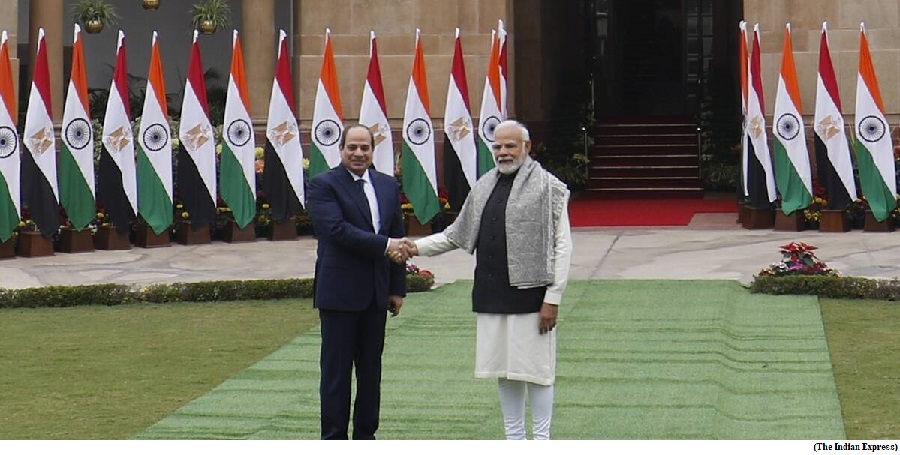Delhi’s Cairo outreach (GS Paper 2, International Relation)

Context:
- The visit of Egypt’s president, Abdel Fattah El-Sisi, to India is not just about India rebuilding ties with an old friend that had been on the margins of India’s diplomacy for too long.
- India’s decision to elevate bilateral ties to the strategic level is rooted in a recognition of the enduring salience of Egypt as a pivotal state sitting at the crossroads of the Middle East, Africa and Europe, with the capacity to influence political outcomes on multiple fronts.
New policy measures:
- Beyond bilateral ties, the renewed engagement with Egypt is also about expanding and consolidating India’s new coalition with moderate Sunni states in the Middle East, including Egypt, Jordan, Saudi Arabia and the United Arab Emirates, which are eager to counter violent religious extremism.
- Stabilising the shared neighbourhood through political and security cooperation has unsurprisingly figured at the top of India’s new strategic partnership with Egypt.
- The current Indian strategy of working with a coalition of moderate Sunni states is very different from it’s past discourse on the Middle East and is in tune with the shifting regional realities.
- India’s strategic partnership with Egypt also opens the door for a larger Indian role in the region which is trying to diversify its partnerships, as the US begins to turn its attention to the Pacific after prolonged and costly military interventions in Iraq and Afghanistan.
- Meanwhile, China is rapidly raising its regional profile in the Middle East.
India-Egypt bonhomie in the 1950s and 1960s:
- At the peak of earlier India-Egypt bonhomie in the 1950s and 1960s, the regional context was vastly different than what it is today.
- At that time, India and Egypt joined hands to limit the role of the West in the region and promoted such supra-national forces such as pan-Asianism, pan-Arabism and Third Worldism. They worked together on isolating Israel and fighting for the liberation of Palestine.
- The region has come a long way since then. After the 1973 war, Egypt dumped its military ties to the Soviet Union and turned to the US as a strategic partner. Egypt was the first Arab state to recognise Israel (Turkey was the first Muslim state to establish relations with Israel).
- The Indian foreign policy discourse, with its deepening anti-Western rhetoric and empathy for radical Arab States in the 1970s, was not empathetic to the concerns and interests of Egypt as it made brave moves to rethink its regional policies.
Major developments:
- The governments in India took a long time adapting to the shifting alignments in the region and new developments that rocked regional politics, including four major developments in 1979 —
- signing of a peace treaty between Israel and Egypt,
- the Islamic revolution in Iran,
- the attack on the Grand Mosque in Mecca, and
- the Soviet occupation of Afghanistan in December.
- In the subsequent years, the Iran-Iraq war, the conflict between US and Iran, US wars in Iraq, the 9/11 attacks, and the rise of Arab oil wealth transformed the region beyond recognition.
- It was only after the 1990s that India began to reorient its regional policies by recognising Israel, by stepping up engagement with the Gulf, which was now becoming a major source of energy for India’s accelerated economic growth, a major destination for labour exports and hard currency remittances.
Challenges before India:
- The new situation presented challenges of its own. As India’s commercial interests grew with the Gulf, relations with the Western part of the Middle East began to decline.
- Within the Gulf too, the Indian strategic focus tended to be riveted on Iran that was deemed critical to India’s Afghan strategies.
- Iran was the only gateway to Central Asia given Pakistan’s reluctance to offer India overland access to Afghanistan and inner Asia. But India’s ties with Iran remain constrained because of the continuing confrontation between Iran and the West on a range of issues.
Strategic position of Egypt:
- India’s new outreach to Egypt now brings greater balance to India’s engagement with the Middle East as a whole.
- As it turns out, Egypt is an important strategic partner for the Gulf Arabs. Emirati and Saudi capital today has a major role in the economic transformation of Egypt and its neighbourhood.
- It might be recalled that the Egyptian armed forces joined the international coalition to liberate Kuwait from Iraqi occupation in 1990-1991. Egypt and the Gulf Arabs have also long shared concerns about Islamic Republic of Iran’s destabilisation of the region.
- After the Arab Spring in 2011, Egypt and the Gulf Arabs have also come together to confront challenges from Sunni extremist forces in the region, like the Muslim Brotherhood backed by Turkey and Qatar.
- India is no stranger to this problem since it has been at the receiving end of the Islamist policies of Turkey and Qatar.
Moderate Sunni Arab leaders:
- The Arab Spring has galvanised the moderate Sunni Arab leaders in Egypt, the UAE and Saudi Arabia to actively counter violent religious extremism and contest the narratives of the radical Islamists.
- While Egypt has long been an inclusive society, the UAE and Saudi Arabia have been deeply religious and conservative Islamic societies. They are now actively pursuing internal social reform, promoting religious tolerance and countering extremist ideologies.
Way Forward:
- The evolution of the Middle East towards political moderation and social modernisation is indeed of special interest, not only to India but also to the entire Subcontinent.
- The extremist ideas from the Middle East had their unfortunate resonance in South Asia, destabilising internal and intra-regional dynamics in the Subcontinent over the last few decades.
- India, therefore, has a big stake in building a strong coalition with moderate Arab Sunni states that could help promote peace and stability in both the Middle East and South Asia.


